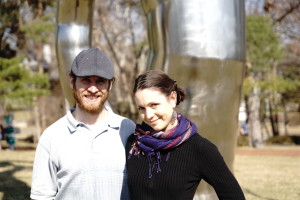
Me and my husband at the Nelson-Atkins Art Museum in Kansas City (a.k.a. proof that I go on vacations that are non-work-related). Photo by J. Wilson.
I don’t vacation well. I’m a bit of a workaholic, so as much as I love travel and meeting new people and seeing new places, it’s hard for me to really, truly interact with the new places and people. I think I’ve figured out part of why this is.
As an academic/belly dancer/sex educator/writer hybrid, I do a lot of things that people think are awesome (hence the tongue-in-cheek “rockstar” title of this post). People want to talk to me and hear about my life, and in turn, I want to hear about their lives in the context of what I do. Whether it’s chatting about favorite fairy tales, discussing sexual norms, or ruminating on the meaning of art and performance, I often find myself in conversations about things that I love and excel at… which are also things that I do for a living.
I realized while at an event this weekend that I had trouble getting into vacation mode because I was either in educator mode or in ethnographer mode, and really I just wanted to relax. When I told people that I study sex or that I teach folklore, they tended to get really excited and either want to launch into stories and jokes from their own lives, or ask me questions in order to get insight into my life and my research. I’m generally happy to have these conversations with folks, but I have trouble navigating between these headspaces and whatever it is I’m supposed to be doing and feeling while on vacation.
I don’t want to sound like I’m complaining that my life is just sooo interesting and people are sooo interested in hearing about it. Rather, it’s that I teach and write as a vocation, and after a while I get sick of hearing my own voice. I interpret cultural artifacts as both a creator (artist/dancer/writer) and as a scholar, and it’s hard to turn that off in my head. I get that being in the moment, with no analytical internal voice, is difficult for many of us academics… but there’s something more to this. Sometimes I’m bored with myself, and I’m tired of talking about what I do. Yet because one of the main things I study is sex, people can’t seem to get enough of my perspective on it. Same goes for fairy tales.
I suspect that this kind of interaction is tiresome for me because as an educator, I spend a lot of time framing topics for people, giving them an overview before going into more detail, and so on. Sometimes I just want to take a break from that. And a lot of the time, I’d rather be the one learning than the one teaching! But in many of situations where I find myself traveling and trying to relax, I’m one of the most knowledgeable people around (yeah, I know how arrogant that sounds), so it’s hard to find someone to teach me. And while everyone’s an expert on their own life, if I try to just listen and learn about that person, I have trouble turning off my analytical brain. So whether I’m doing the talking or the listening, it feels like I’m going to feel kinda burned out and bummed out no matter what.
Hopefully this’ll resolve itself with a mental shift, but I’m curious to hear from other rockstars in their respective fields: how do you tackle this issue when trying to vacation? Do you just clam up about what you do in the rest of your life? Do you try to find some other way to engage people? I need some solutions, because I’m running out of ideas on how to relax around people.
